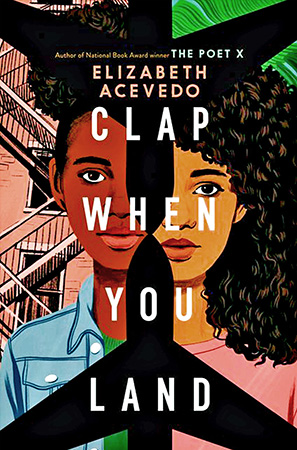
Camino Rios lives for the summers when her father visits her in the Dominican Republic. But this time, on the day when his plane is supposed to land, Camino arrives at the airport to see crowds of crying people…
In New York City, Yahaira Rios is called to the principal’s office, where her mother is waiting to tell her that her father, her hero, has died in a plane crash.
Separated by distance—and Papi’s secrets—the two girls are forced to face a new reality in which their father is dead and their lives are forever altered.
And then, when it seems like they’ve lost everything about their father, they learn of each other.
Book Review Blog: Clap When You Land
As of late, I have a growing hunger to learn more about my roots. As far as I know, by way of my parents, my ancestry is that I am of Dominican and Puerto Rican descent (I am currently waiting for my DNA to be analyzed to see where I truly come from). My book library primarily consists of genre fiction (horror), non-fiction, paranormal to true crime, a couple of memoirs, and biographies. But, for some reason, I have never delved into the literature and writings of authors of a similar background – my heritage.
I want to read memoirs, personal accounts, and experiences, particularly from a male perspective from American-born Dominicans such as myself. So I turned to Google. From the Google hits garnered after I typed in “male American-born Dominican authors” in the search bar and pounded on the “enter” key of my keyboard, I was amazed at the lack of my desired results. However, there were a healthy amount of female authors, including the likes of Kianny N. Antigua, Angie Cruz, and Elizabeth Acevedo. I was given a copy of Drown by the acclaimed Dominican author Junot Diaz when I was in high school but neglected to read it. And while he is an author that I plan on revisiting soon, I currently want to read American-born authors as I feel I will relate to them more.
“Can you be from a place
you have never been?
You can find the island stamped all over me,
but what would the island find if I was there?
Can you claim a home that does not know you,
much less claim you as its own?”― Elizabeth Acevedo, Clap When You Land
I remember being about five or six years old when I first went to the Dominican Republic with my parents and that now-all-too-familiar sound of clapping and praise when the plane touched down. I was confused. I looked at my mom and asked her what happened. She made the sign of the cross and said, “We landed.” That always stuck with me because it was the first time that I understood that there might be, indeed, something powerful looking out for my family and me. And so it was why I picked up Elizabeth Acevedo’s’ Clap When You Land. Upon reading the title, I got it, I understood the reference, and it conjured up memories of my childhood.
The book is dedicated to those souls lost on flight 587 on November 12, 2001, flying out of John F. Kennedy International Airport in Queens, NY en route to Santo Domingo, the capital of the Dominican Republic. I remember this well for two reasons: 1.) I grew up in NYC in Washington Heights, and so the impact was felt hard in the community – did I, or my family, know anyone on that flight? This question swirled in our minds for weeks and 2.) This crash occurred just two months after 9/11, the biggest terrorist attack on American soil. There were initial questions if Flight 587 was another attack but, alas, the notion was ruled out. And just like that, the story was out of the limelight. But the community still mourned, and I felt like I suffered a huge blow even though I, nor my family, didn’t know anyone on that flight.
In Clap When You Land, Camino is en route to the Santo Domingo airport, where she is to pick up her father. When she arrives, she encounters people crying, a scene of despair, tears, and hearts shattered. Camino learns of the crash and her world reels and spins, knowing that was the flight her father was aboard. In New York, Yahaira is in school when she is called to the principal’s office. There, she is met by her distraught mother, and it is evident that something is amiss. Her father, too, was on that flight. Yahaira’s heart is destroyed as she never got to say goodbye to her dad, and, elsewhere, Camino would never get to say “hello” to her father ever again.
Clap When You Land is written in verse, a form I am not accustomed to as it is not what I would not consider a more traditional format. Acevedo is widely known as a poet, so fans of her work may be used to this format. It is a tragic story of loss, betrayal, love, forgiveness, identity, and acceptance. Acevedo has woven a beautiful story of two girls with a common denominator and is brought together through a tragic event that sheds light on an overbearing secret. In many respects, I saw myself in these two young women grappling with a secret that, on the surface, is poised to divide any family. The story resonated with me. I saw my dad, I saw my mom, my siblings, and saw my elusive culture through Camino and Yahaira. Acevedo’s writing is magnificent in that her words conveyed the emotions of both Camino and Yahaira magnificently. These two girls struggled to cope with a tragedy and what came to them in the afterward of the disaster. Clap When You Land, although billed as YA (young adult) fiction can still be easily read and enjoyed by adults alike. This book has made me a fan of Acevedo, and I look forward to reading more of her work in the near future
